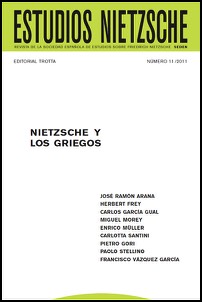Nietzsche’s Critical Discussion with Plato
DOI:
https://doi.org/10.24310/EstudiosNIETen.vi11.10507Keywords:
logos, revaluation, metaphysicsAbstract
Nietzsche characterizes his own thinking as the «transformation of the Dionysiac into a philosophical pathos» (Ecce homo, «Birth of Tragedy»). Pathos is taken as a counter-concept against European metaphysics, presenting itself as a philosophy of the logos since its foundation by Socrates and Plato. Nietzsche’s life-long altercation with the two Athenians is the attempt to revalue the philosophical values established in Plato’s
writings under the conditions of Modernity. In this project, however, Nietzsche discovers more and more the individuals beyond the philosophy of the logos: Socrates beyond ‘Socratism’ and Plato beyond ‘Platonism’.
Downloads
Metrics
References
Bremer, Dieter, «Platonisches, Antiplatonisches. Aspekte der Platon-Rezeption in Nietzsches Versuch einer Wiederherstellung des frühgrichischen Daseinsvertändniss», en Nietzsche-Studien 8 (1979), 39-103.
Derrida, J., Die Postkarte von Sokrates bis Freud und jenseits. 1. Lieferung. Berlin 1982 (Paris 1980).
Emge, C. A., Der “umgedrehter Platonismus”. Anregungen Nietzsches zur Situationphilosophie) Wiesbaden, 1952.
Erwin Schlimgen, Erwin, Nietzsches Theorie des Bewusstseins, Berlín: W. de Gruyter, 1988.
Erwin Schlimgen, «Stichwort: Vernunft», en Christian Niemeyer (Hg): Nietzsche-Lexicon, Darmstadt 2009.
Gasser, P., Rhetorische Philosophie. Leseversuche zum metaphorischen Diskurs in Nietzsches «Also sprach Zarathustra», Bern, Berlin, Frankfurt a. M. 1992.
Gerhardt, Volker, Also sprach Zarathustra, Berlin, 2000.
Ghedini, F., II Platone di Nietzsche. Genesi e motivi di un simbolo controverso (1846-1879), Nápoles, 1999.
Lampert, Laurence, «Nietzsche and Plato», en Paul Bishop (ed.), Nietzsche and Antiquity: His Reaction and
Response tot he Classical Tradition, Rochester, 2004, pp. 205-219.
Lossi, Annamaria, Nietzsche und Platon: Begegnung auf dem Weg der Umdrehung des Platonismus (Nietzsche y Platón: enfrentamiento en el camino de inversión del platonismo), Würzburg, 2006.
Maurer, Reinhardt Klemens, “Das antiplatonische Experiment Nietzsches. Zum Problem einer konsequenten Ideologiekritik”, Nietzsche-Studien 8 (1979), 104-126.
Mihailo Djuric, Mihailo, «Dichten und Denken im ‘Zarathustra’», en Simon, J. - Djuric, M. (ed.), Kunst und Wissenschaft bei Nietzsche, Würzburg, 1986, pp. 75-100.
Müller, Enrico. «’Aesthetische Lust ‘ und ‘dionysische Weisheit’. Nietzsches Deutung der griechischen Tragödie», en Nietzsche-Studien 31 (2002), 134-153.
Nietzsche, F., Obras Completas, I-IV (OC ). Director ed. Diego Sánchez Meca. Madrid: Tecnos, 2011-2016
Nietzsche, F., Correspondencia I-VI. (CO). Director ed. Luis E. de Santiago Guervós. Madrid : Trotta, 2005- 2012.
Nietzsche, F., Fragmentos Póstumos I-IV (FP). Director ed. Diego Sánchez Meca. Madrid: Tecnos, 2006-2010.
Saar, Michael, Genealogie als Kritik, Frankfurt a. M., 2007.
Teichmüller, Gustav. Die wirkliche und die scheinbare Welt, Breslau, 1882.
Thomas, Douglas, Reading Nietzsche Rhetorically, New York, 1999.
Wiehl, R. «Nietzsches Anti-Platonismus», en Herméneutique et ontologie: melanges et hommage a Pierre Aubenque, phronimos, Paris, 1990, pp. 275-296.
Zittel, Claus, Das ästhetische Kalkül von Friedrich Nietzsches Also sprach Zarathustra, Würzburg, 2000.
Zuckert, Catherine, en Postmodern Platos: Nietzsche, Heidegger, Gadamer, Strauss, Derrida. Chicago, 1996
Downloads
Published
How to Cite
Issue
Section
License
As of issue 21 (2021) this journal is published only in open access (diamond route).
From that number 21, like the previous numbers published in NIETZSCHE STUDIES, they are subject to the Creative Commons Acknowledgment-NoComercia-ShareIgual 4.0 license, the full text of which can be consulted at <http://creativecommons.org/licenses/by-nc-sa/4.0 >
It is the responsibility of the authors to obtain the necessary permissions of the images that are subject to copyright.
This work is licensed under a Creative Commons Attribution-NonCommercial-ShareAlike 4.0 International License.
Copyright generates two different rights: moral rights and patrimonial rights that EJFB recognizes and respects. Moral rights are those relating to the recognition of the authorship. They are rights of a personal nature that are perpetual, inalienable, unseizable and imprescriptible as consequence of the indivisible union of the author and his/her work.
Patrimonial rights are those that can be derived from the reproduction, distribution, adaptation or communication of the work, among others.







11.png)
